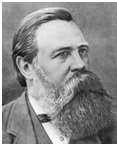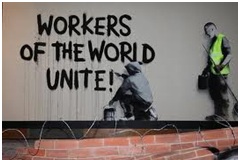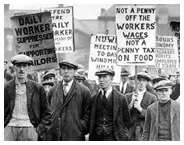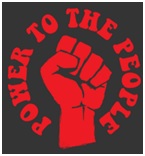|
 |
|
 |
|
|
||
Karl Marx - Philosophy, Work and Happiness
Karl Marx (1818-83)
German philosopher (pictured right) and founder of modern communism (or socialism), who:
Who influenced him?
His most famous book is... Das Kapital, published in three volumes(1861, 1885 and 1894).
What did he say about work and happiness?
1. Violent revolution The capitalist system (including private property and profit-making businesses) must be overthrown and abolished by the workers (the “proletariat”). To do this the workers will have to fight together: “Workers of the world, unite!”, he wrote with Friedrich Engels in the Communist Manifesto of 1848. There are two stages in the workers' revolution:
a) “dictatorship of the proletariat”, (in which government controls people with the aim of giving them freedom and control over their lives in a classless society - see next stage).
b) “communism” This is the classless society which Engels described as “the withering away of the state”.
2. Class struggle In capitalism there is a constant battle between:
“The history of all hitherto existing society is the history of the class struggle”, Marx said in the Communist Manifesto. Marx predicted the destruction of capitalism from:
3. “Alienation” Workers are unhappy (or alienated) at work, because they are exploited by
their bosses with:
Friedrich Engels described workers’ poverty and exploitation in his book, The Condition of the Working Class in England(1844).
4. Change Everything must be questioned and challenged, so that the world can be completely changed. “Everything must be doubted” was Marx’s favourite maxim.
5. Happiness He wanted everyone to be happy and fulfilled in their work and leisure. How?
a) revolution The replacement of capitalism with communism (see point 1 above).
b) variety Specializing in one job (division of labour) is boring, so people must do different jobs and activities. c) power to the people Marx wanted everyone to:
d) satisfaction of people’s needs Everyone should:
So Marx said: “From each according to his ability, to each according to his needs”.
6. Ideology matters Marx wanted a workers' revolution that would change the world, freeing them from capitalist control. So written on his gravestone in Highgate Cemetery in London are the words: “The philosophers have only interpreted the world in various ways - the point however is to change it”.
Key quote on society From each according to his abilities, to each according to his needs. The philosophers have only interpreted the world in various ways - the point however is to change it (written on Marx’s gravestone).
Key quotes on religion Religion is... the opium of the people.
Key quotes on workers Workers of the world, unite, written with Friedrich Engels in The Communist Manifesto (1848). The history of all hitherto existing society is the history of the class struggle (in The Communist Manifesto). Capital is dead labour which, vampire-like, lives only by sucking living labour. |
|
|
||
|
|
||
| Copyright © wisdomtowin.com 2025 All Rights Reserved | ||
|












